tow RENAULT KANGOO 2012 X61 / 2.G User Guide
[x] Cancel search | Manufacturer: RENAULT, Model Year: 2012, Model line: KANGOO, Model: RENAULT KANGOO 2012 X61 / 2.GPages: 237, PDF Size: 8.62 MB
Page 100 of 237
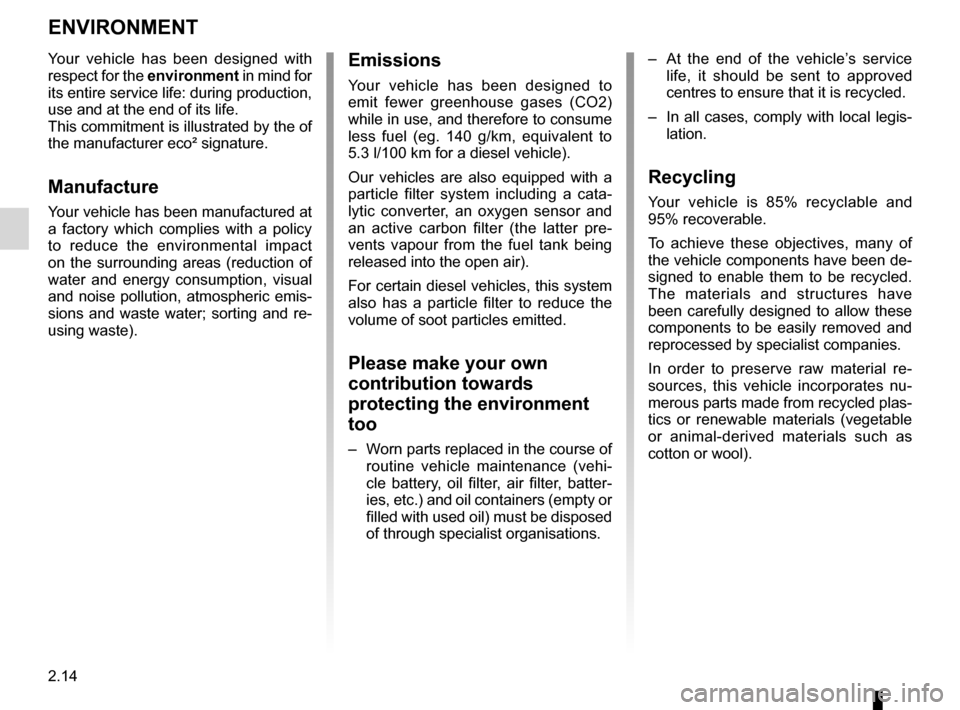
environment .......................................... (up to the end of the DU)
2.14
ENG_UD25716_1
Environnement (sans marque) (X44 - X45 - X77 - X81 - X85 - X90 - X91 - X83 - X61 - TEST - X95 - J95 - R95 - F90 Ph2 - X33 - X47 - X43 - X38 - H79 - X62 - X32 - X09 -
ENG_NU_813-11_FK61_Renault_2
Environment
ENVIRONMENT
Emissions
Your vehicle has been designed to
emit fewer greenhouse gases (CO2)
while in use, and therefore to consume
less fuel (eg. 140 g/km, equivalent to
5.3 l/100 km for a diesel vehicle).
Our vehicles are also equipped with a
particle filter system including a cata -
lytic converter, an oxygen sensor and
an active carbon filter (the latter pre -
vents vapour from the fuel tank being
released into the open air).
For certain diesel vehicles, this system
also has a particle filter to reduce the
volume of soot particles emitted.
Please make your own
contribution towards
protecting the environment
too
– Worn parts replaced in the course of
routine vehicle maintenance (vehi -
cle battery, oil filter, air filter, batter -
ies, etc.) and oil containers (empty or
filled with used oil) must be disposed
of through specialist organisations. –
At the end of the vehicle’s service
life, it should be sent to approved
centres to ensure that it is recycled.
– In all cases, comply with local legis -
lation.
Recycling
Your vehicle is 85% recyclable and
95% recoverable.
To achieve these objectives, many of
the vehicle components have been de-
signed to enable them to be recycled.
The materials and structures have
been carefully designed to allow these
components to be easily removed and
reprocessed by specialist companies.
In order to preserve raw material re -
sources, this vehicle incorporates nu -
merous parts made from recycled plas-
tics or renewable materials (vegetable
or animal-derived materials such as
cotton or wool).
Your vehicle has been designed with
respect for the
environment in mind for
its entire service life: during production,
use and at the end of its life.
This commitment is illustrated by the of
the manufacturer eco² signature.Manufacture
Your vehicle has been manufactured at
a factory which complies with a policy
to reduce the environmental impact
on the surrounding areas (reduction of
water and energy consumption, visual
and noise pollution, atmospheric emis-
sions and waste water; sorting and re-
using waste).
Page 114 of 237
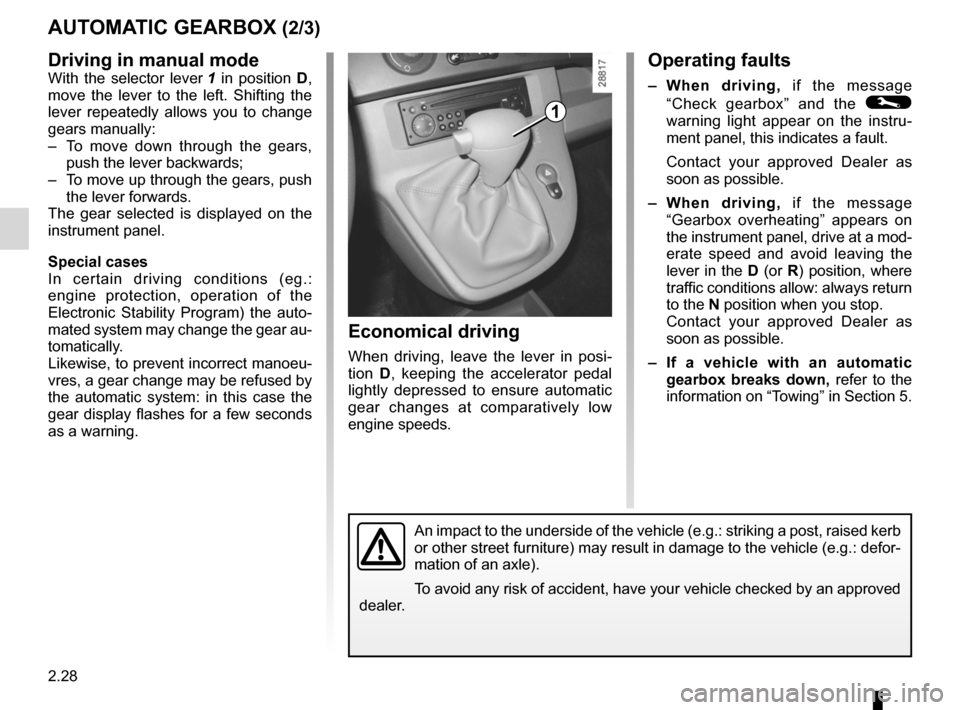
2.28
ENG_UD14843_2
Boîte automatique (X61 - Renault)
ENG_NU_813-11_FK61_Renault_2
Jaune NoirNoir texte
Operating faults
– When driving, if the message
“Check gearbox” and the
©
warning light appear on the instru -
ment panel, this indicates a fault.
Contact your approved Dealer as
soon as possible.
– When driving, if the message
“Gearbox overheating” appears on
the instrument panel, drive at a mod-
erate speed and avoid leaving the
lever in the D (or R) position, where
traffic conditions allow: always return
to the N position when you stop.
Contact your approved Dealer as
soon as possible.
– If a vehicle with an automatic
gearbox breaks down, refer to the
information on “Towing” in Section 5.
AUTOMATIC GEARbOx (2/3)
Driving in manual mode
With the selector lever 1 in position D,
move the lever to the left. Shifting the
lever repeatedly allows you to change
gears manually:
– To move down through the gears,
push the lever backwards;
– To move up through the gears, push
the lever forwards.
The gear selected is displayed on the
instrument panel.
Special cases
In certain driving conditions (eg.:
engine protection, operation of the
Electronic Stability Program) the auto -
mated system may change the gear au-
tomatically.
Likewise, to prevent incorrect manoeu -
vres, a gear change may be refused by
the automatic system: in this case the
gear display flashes for a few seconds
as a warning.
1
Economical driving
When driving, leave the lever in posi -
tion D, keeping the accelerator pedal
lightly depressed to ensure automatic
gear changes at comparatively low
engine speeds.
An impact to the underside of the vehicle (e.g.: striking a post, raised kerb
or other street furniture) may result in damage to the vehicle (e.g.: defor-
mation of an axle).
To avoid any risk of accident, have your vehicle checked by an approved
dealer.
Page 117 of 237
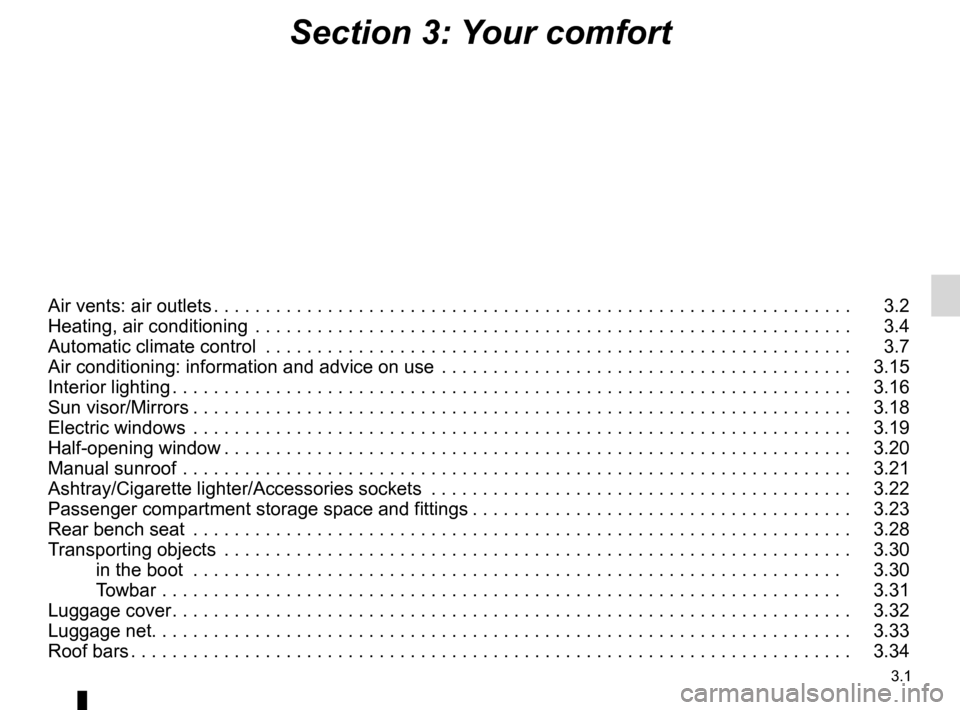
3.1
ENG_UD29763_11
Sommaire 3 (X61 - F61 - K61 - Renault)
ENG_NU_813-11_FK61_Renault_3
Section 3: Your comfort
Air vents: air outlets . . . . . . . . . . . . . . . . . . . . . . . . . . . . . . . . . . . . . . . . . . . . . . . . . . . . . . . . . . . . . . 3.2
Heating, air conditioning . . . . . . . . . . . . . . . . . . . . . . . . . . . . . . . . . . . . . . . . . . . . . . . . . . . . . . . . . . 3.4
Automatic climate control . . . . . . . . . . . . . . . . . . . . . . . . . . . . . . . . . . . . . . . . . . . . . . . . . . . . . . . . . 3.7
Air conditioning: information and advice on use . . . . . . . . . . . . . . . . . . . . . . . . . . . . . . . . . . . . . . . . 3.15
Interior lighting . . . . . . . . . . . . . . . . . . . . . . . . . . . . . . . . . . . . . . . . . . . . . . . . . . . . . . . . . . . . . . . . . . 3.16
Sun visor/Mirrors . . . . . . . . . . . . . . . . . . . . . . . . . . . . . . . . . . . . . . . . . . . . . . . . . . . . . . . . . . . . . . . . 3.18
Electric windows . . . . . . . . . . . . . . . . . . . . . . . . . . . . . . . . . . . . . . . . . . . . . . . . . . . . . . . . . . . . . . . . 3.19
Half-opening window . . . . . . . . . . . . . . . . . . . . . . . . . . . . . . . . . . . . . . . . . . . . . . . . . . . . . . . . . . . . . 3.20
Manual sunroof . . . . . . . . . . . . . . . . . . . . . . . . . . . . . . . . . . . . . . . . . . . . . . . . . . . . . . . . . . . . . . . . . 3.21
Ashtray/Cigarette lighter/Accessories sockets . . . . . . . . . . . . . . . . . . . . . . . . . . . . . . . . . . . . . . . . . 3.22
Passenger compartment storage space and fittings . . . . . . . . . . . . . . . . . . . . . . . . . . . . . . . . . . . . . 3.23
Rear bench seat . . . . . . . . . . . . . . . . . . . . . . . . . . . . . . . . . . . . . . . . . . . . . . . . . . . . . . . . . . . . . . . . 3.28
Transporting objects . . . . . . . . . . . . . . . . . . . . . . . . . . . . . . . . . . . . . . . . . . . . . . . . . . . . . . . . . . . . . 3.30
in the boot . . . . . . . . . . . . . . . . . . . . . . . . . . . . . . . . . . . . . . . . . . . . . . . . . . . . . . . . . . . . . . . 3.30
Towbar . . . . . . . . . . . . . . . . . . . . . . . . . . . . . . . . . . . . . . . . . . . . . . . . . . . . . . . . . . . . . . . . . . 3.31
Luggage cover . . . . . . . . . . . . . . . . . . . . . . . . . . . . . . . . . . . . . . . . . . . . . . . . . . . . . . . . . . . . . . . . . . 3.32
Luggage net . . . . . . . . . . . . . . . . . . . . . . . . . . . . . . . . . . . . . . . . . . . . . . . . . . . . . . . . . . . . . . . . . . . . 3.33
Roof bars . . . . . . . . . . . . . . . . . . . . . . . . . . . . . . . . . . . . . . . . . . . . . . . . . . . . . . . . . . . . . . . . . . . . . . 3.34
Page 120 of 237
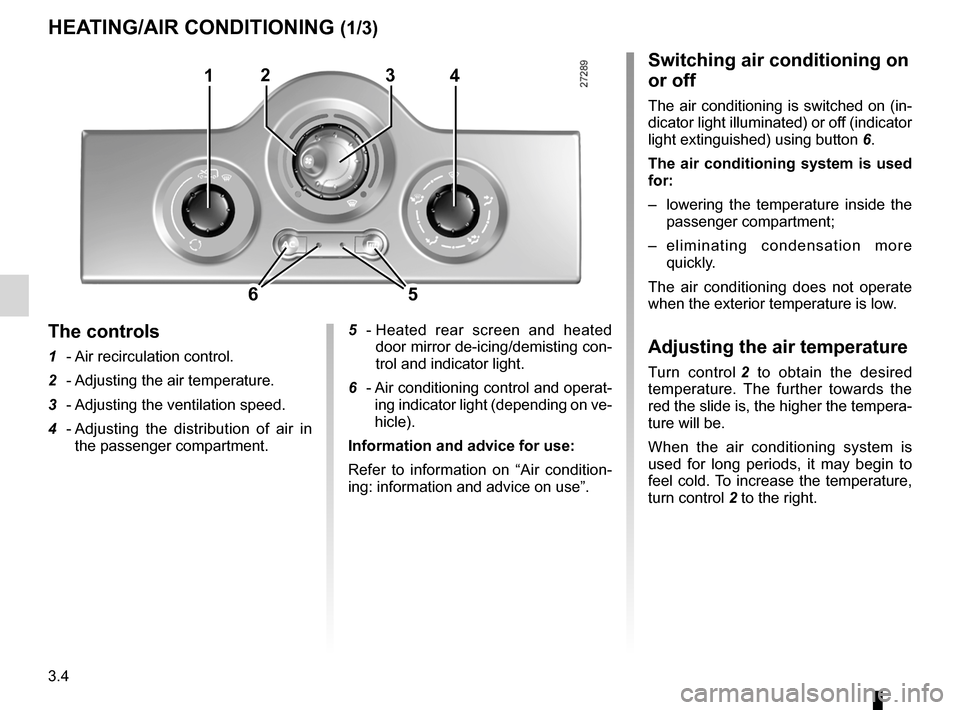
air conditioning ..................................... (up to the end of the DU)
heating system ..................................... (up to the end of the DU)
air conditioning ..................................... (up to the end of the DU)
rear screen demisting ......................................................... (current page)
demisting rear screen ....................................................... (current page)
temperature regulation ......................... (up to the end of the DU)
ventilation ............................................. (up to the end of the DU)
heating and air conditioning system ..... (up to the end of the DU)
3.4
ENG_UD12366_3
Chauffage / Air conditionné (X61 - F61 - K61 - X61 BUp - Renault)
ENG_NU_813-11_FK61_Renault_3
Jaune NoirNoir texte
Heating/air conditioning
switching air conditioning on
or off
The air conditioning is switched on (in-
dicator light illuminated) or off (indicator
light extinguished) using button 6.
the air conditioning system is used
for:
– lowering the temperature inside the
passenger compartment;
– e l i m i n a t i n g c o n d e n s a t i o n m o r e
quickly.
The air conditioning does not operate
when the exterior temperature is low.
Adjusting the air temperature
Turn control 2 to obtain the desired
temperature. The further towards the
red the slide is, the higher the tempera-
ture will be.
When the air conditioning system is
used for long periods, it may begin to
feel cold. To increase the temperature,
turn control 2 to the right.
5
- Heated rear screen and heated
door mirror de-icing/demisting con-
trol and indicator light.
6 - Air conditioning control and operat-
ing indicator light (depending on ve-
hicle).
information and advice for use:
Refer to information on “Air condition -
ing: information and advice on use”.
the controls
1 - Air recirculation control.
2 - Adjusting the air temperature.
3 - Adjusting the ventilation speed.
4 - Adjusting the distribution of air in
the passenger compartment.
HeA tinG/Air COnDitiOninG (1/3)
1423
65
Page 121 of 237
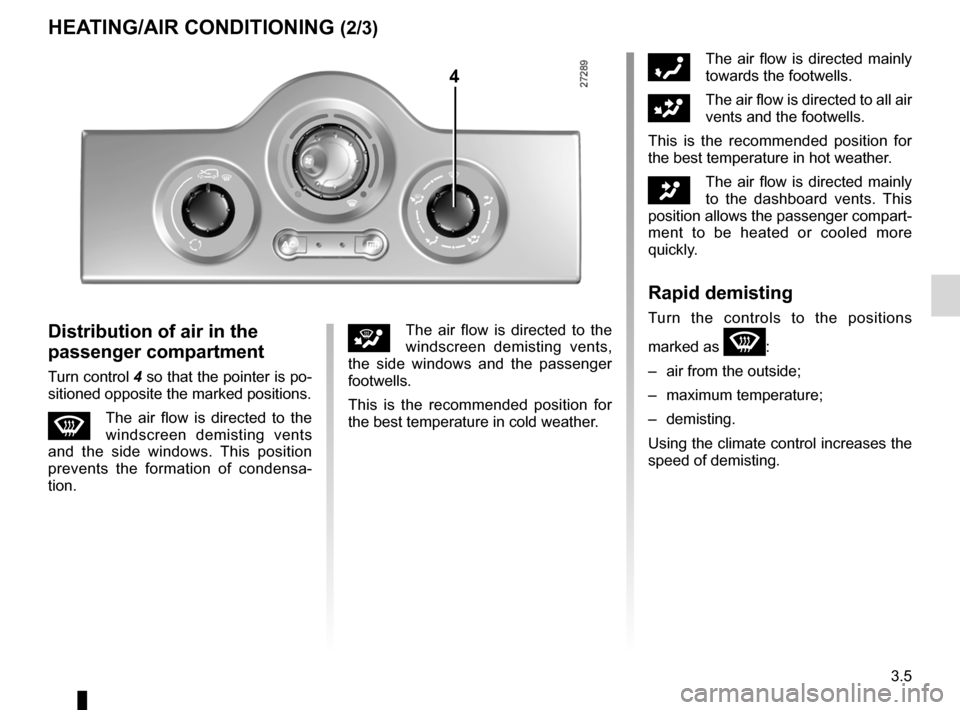
demistingwindscreen ....................................................... (current page)
JauneNoirNoir texte
3.5
ENG_UD12366_3
Chauffage / Air conditionné (X61 - F61 - K61 - X61 BUp - Renault)
ENG_NU_813-11_FK61_Renault_3
óThe air flow is directed mainly
towards the footwells.
GThe air flow is directed to all air
vents and the footwells.
This is the recommended position for
the best temperature in hot weather.
JThe air flow is directed mainly
to the dashboard vents. This
position allows the passenger compart-
ment to be heated or cooled more
quickly.
rapid demisting
Turn the controls to the positions
marked as
W:
– air from the outside;
– maximum temperature;
– demisting.
Using the climate control increases the
speed of demisting.iThe air flow is directed to the
windscreen demisting vents,
the side windows and the passenger
footwells.
This is the recommended position for
the best temperature in cold weather.
HeA tinG/Air COnDitiOninG (2/3)
Distribution of air in the
passenger compartment
Turn control 4 so that the pointer is po-
sitioned opposite the marked positions.
WThe air flow is directed to the
windscreen demisting vents
and the side windows. This position
prevents the formation of condensa -
tion.
4
Page 122 of 237
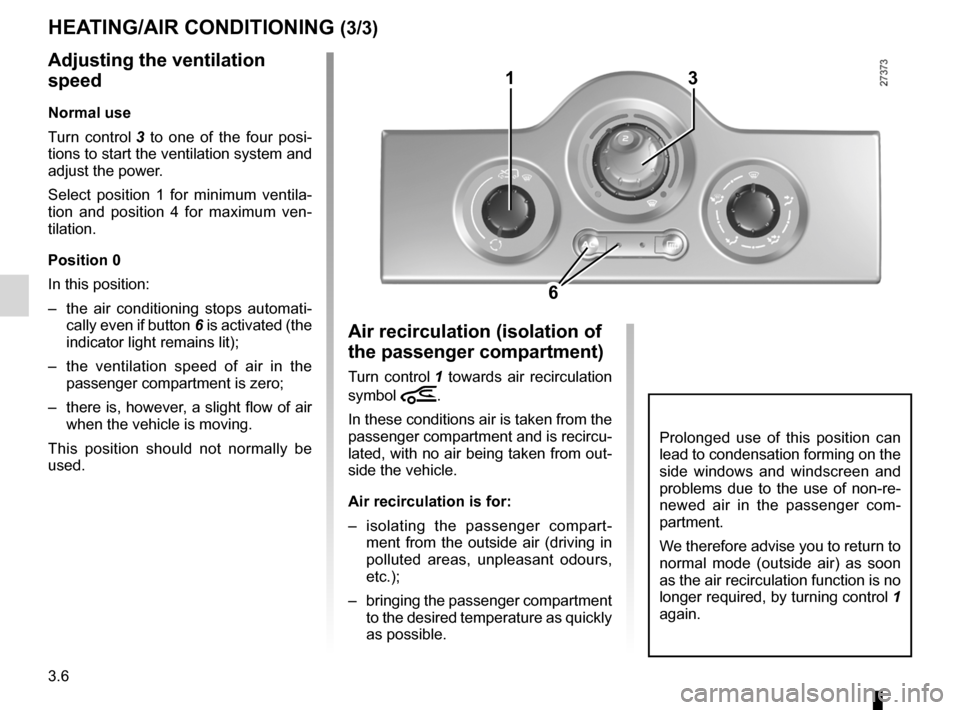
3.6
ENG_UD12366_3
Chauffage / Air conditionné (X61 - F61 - K61 - X61 BUp - Renault)
ENG_NU_813-11_FK61_Renault_3
Adjusting the ventilation
speed
normal use
Turn control 3 to one of the four posi -
tions to start the ventilation system and
adjust the power.
Select position 1 for minimum ventila -
tion and position 4 for maximum ven -
tilation.
Position 0
In this position:
– the air conditioning stops automati -
cally even if button 6 is activated (the
indicator light remains lit);
– the ventilation speed of air in the
passenger compartment is zero;
– there is, however, a slight flow of air
when the vehicle is moving.
This position should not normally be
used.
HeA tinG/Air COnDitiOninG (3/3)
Air recirculation (isolation of
the passenger compartment)
Turn control 1 towards air recirculation
symbol
â.
In these conditions air is taken from the
passenger compartment and is recircu-
lated, with no air being taken from out-
side the vehicle.
Air recirculation is for:
– isolating the passenger compart -
ment from the outside air (driving in
polluted areas, unpleasant odours,
etc.);
– bringing the passenger compartment
to the desired temperature as quickly
as possible.
Prolonged use of this position can
lead to condensation forming on the
side windows and windscreen and
problems due to the use of non-re -
newed air in the passenger com -
partment.
We therefore advise you to return to
normal mode (outside air) as soon
as the air recirculation function is no
longer required, by turning control 1
again.
13
6
Page 126 of 237
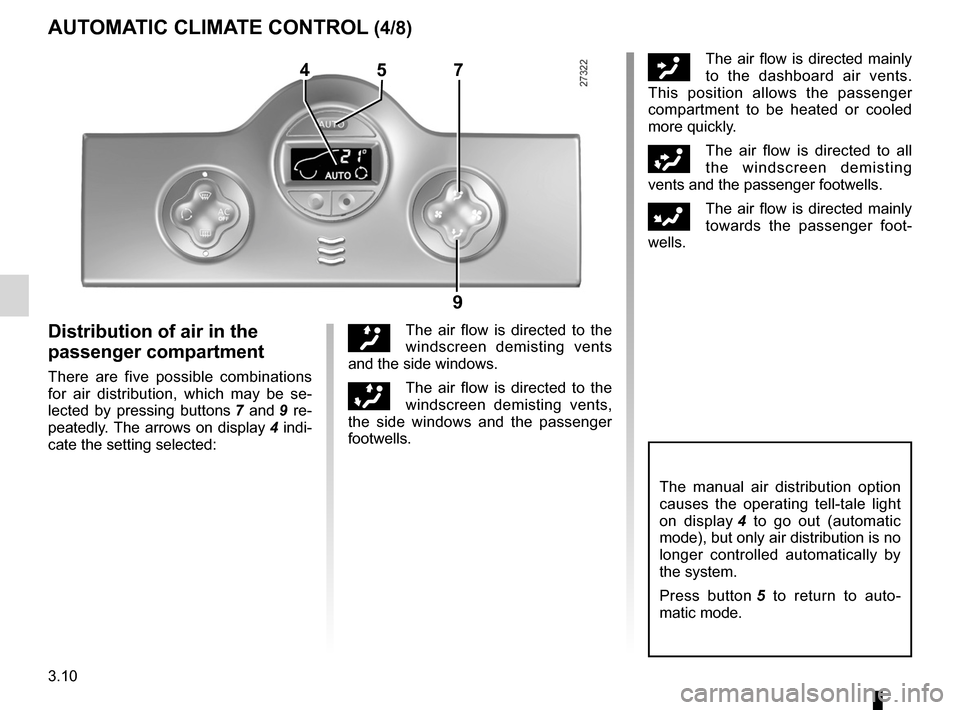
3.10
ENG_UD10847_2
Air conditionné automatique (X61 - F61 - K61 - X61 BUp - Renault)
ENG_NU_813-11_FK61_Renault_3
Jaune NoirNoir texte
ôThe air flow is directed mainly
to the dashboard air vents.
This position allows the passenger
compartment to be heated or cooled
more quickly.
öThe air flow is directed to all
the windscreen demisting
vents and the passenger footwells.
FThe air flow is directed mainly
towards the passenger foot -
wells.
The manual air distribution option
causes the operating tell-tale light
on display 4 to go out (automatic
mode), but only air distribution is no
longer controlled automatically by
the system.
Press button 5 to return to auto -
matic mode.
Distribution of air in the
passenger compartment
There are five possible combinations
for air distribution, which may be se -
lected by pressing buttons 7 and 9 re -
peatedly. The arrows on display 4 indi-
cate the setting selected:
AUt OMA tiC CLiMA te COntrOL (4/8)
õThe air flow is directed to the
windscreen demisting vents
and the side windows.
÷The air flow is directed to the
windscreen demisting vents,
the side windows and the passenger
footwells.
47
9
5
Page 131 of 237
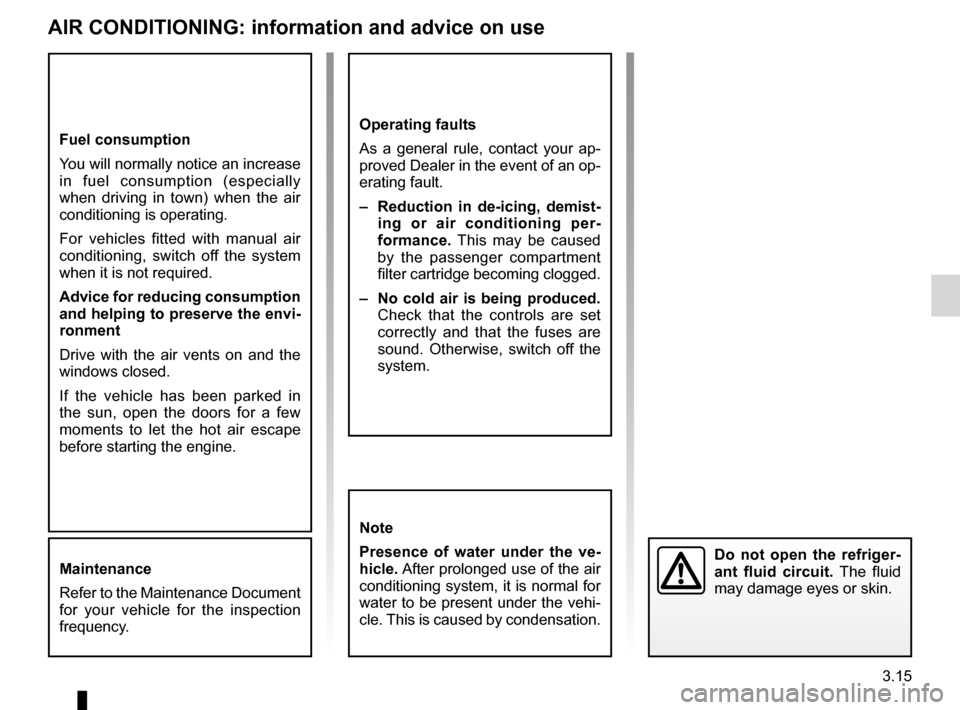
air conditioning ..................................... (up to the end of the DU)
heating system ..................................... (up to the end of the DU)
air conditioning ..................................... (up to the end of the DU)
temperature regulation ......................... (up to the end of the DU)
ventilation ............................................. (up to the end of the DU)
heating and air conditioning system ..... (up to the end of the DU)
3.15
ENG_UD10048_2
Air conditionné : informations et conseils d’utilisation (X61 - F61 - K61 - Renault)
ENG_NU_813-11_FK61_Renault_3
Air conditioning: information and advice on use
Operating faults
As a general rule, contact your ap-
proved Dealer in the event of an op-
erating fault.
– r eduction in de-icing, demist -
ing or air conditioning per -
formance. This may be caused
by the passenger compartment
filter cartridge becoming clogged.
– no cold air is being produced.
Check that the controls are set
correctly and that the fuses are
sound. Otherwise, switch off the
system.Fuel consumption
You will normally notice an increase
in fuel consumption (especially
when driving in town) when the air
conditioning is operating.
For vehicles fitted with manual air
conditioning, switch off the system
when it is not required.
Advice for reducing consumption
and helping to preserve the envi-
ronment
Drive with the air vents on and the
windows closed.
If the vehicle has been parked in
the sun, open the doors for a few
moments to let the hot air escape
before starting the engine.
Air COnDitiOninG: information and advice on use
note
Presence of water under the ve -
hicle. After prolonged use of the air
conditioning system, it is normal for
water to be present under the vehi-
cle. This is caused by condensation.
Do not open the refriger -
ant fluid circuit. The fluid
may damage eyes or skin.Maintenance
Refer to the Maintenance Document
for your vehicle for the inspection
frequency.
Page 137 of 237
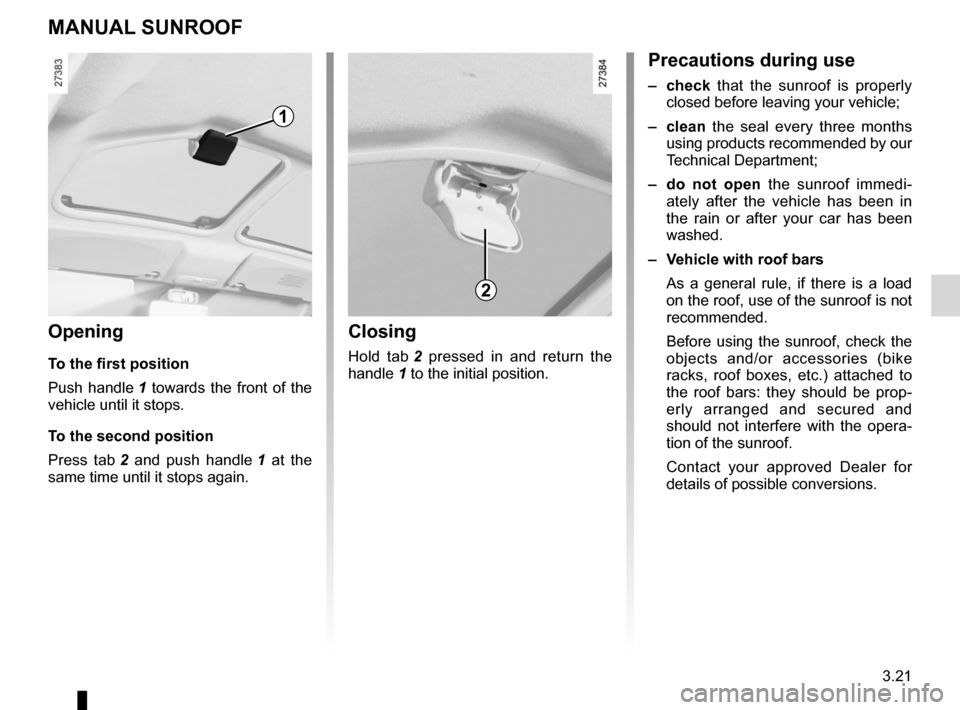
sunroof.................................................. (up to the end of the DU)
3.21
ENG_UD9535_2
Toit ouvrant à commande manuelle (X61 - F61 - K61 - Renault)
ENG_NU_813-11_FK61_Renault_3
Manual sunroof
MAnUAL sUnrOOF
Opening
t o the first position
Push handle 1 towards the front of the
vehicle until it stops.
t o the second position
Press tab 2 and push handle 1 at the
same time until it stops again.
1
2
Precautions during use
– check that the sunroof is properly
closed before leaving your vehicle;
– clean the seal every three months
using products recommended by our
Technical Department;
– do not open the sunroof immedi -
ately after the vehicle has been in
the rain or after your car has been
washed.
– v ehicle with roof bars
As a general rule, if there is a load
on the roof, use of the sunroof is not
recommended.
Before using the sunroof, check the
objects and/or accessories (bike
racks, roof boxes, etc.) attached to
the roof bars: they should be prop -
erly arranged and secured and
should not interfere with the opera -
tion of the sunroof.
Contact your approved Dealer for
details of possible conversions.
Closing
Hold tab 2 pressed in and return the
handle 1 to the initial position.
Page 147 of 237

towing equipmentfitting ................................................................ (current page)
JauneNoirNoir texte
3.31
ENG_UD29642_4
Transports d’objets dans le coffre (X61 - F61 - K61 - Renault)
ENG_NU_813-11_FK61_Renault_3
Towbar
trAnsPOrtinG OBjeCts in tHe BOOt (2/2)/t OWinG
Permissible nose weight, maxi -
mum permissible towing weight,
braked and unbraked: refer to
the information on “Weights” in
Section 6.
For fitting and conditions of use,
refer to the equipment’s fitting in -
structions.
Please keep these instructions with
the rest of the vehicle documenta -
tion.
If the towbar ball obscures the regis-
tration plate or the rear fog lights, it
should be removed when not in use.
In all cases, comply with local leg -
islation.
A = 776.5 mm.
A